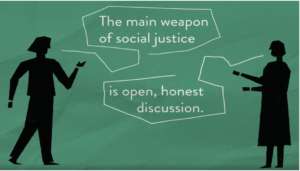
The need for greater diversity and inclusivity is widely recognised, with events such as World Day for Cultural Diversity an opportunity to help communities understand the value of cultural diversity and learn how to live together in harmony. Which is easy to say, but I have often felt that people – including myself – can feel hesitant speaking on the topic due to the fear of using wrong language, politically incorrect terminology or accidentally making insensitive comments. The message of this blog post is to provide reassurance that it is okay to be nervous when discussing cultural diversity! It is a feeling that most people face, and open, honest discussion is the method of overcoming.
I had the pleasure of speaking to Equality and Diversity Office, Marije Davidson, BAME students’ officer, Kalen Reid and Senior Lecturer, Nathalie Noret.
Do you think people get nervous when teaching or discussing equality and diversity?
Nathalie Noret – Yes, without a doubt. From my own experience, when I first started presenting and teaching on diversity and inclusion, I used to get incredibly nervous. I worried about whether I was using the right language and used to really worry about saying something wrong and end up offending someone. I remember one of my earliest conference presentations was on islamophobia in schools. I was presenting to an incredibly diverse audience and was absolutely terrified I’d say something wrong. A further challenge is how to manage discussions if someone says something that could be deemed offensive and how to manage discussions so everyone can contribute and have an opinion, but where misunderstandings and inaccurate views can be challenged safely. I think nervousness around using the wrong language and the fear of offending someone are quite common and it’s not something we typically discuss openly.
What has been your most challenging experience related to discussing equality and diversity and how did you manage this?
Nathalie Noret – I think the one that comes to mind the most occurred when delivering a session for the All About Respect project on sexual violence. A male student in the audience stood up in the middle of the session, clearly very angry and challenged me on the discussion. He argues that sexual harassment wasn’t an issue on campus, and even if it was there’s nothing, we can do about it. I was really taken aback as he was very aggressive in his language use, but at the same time I was acutely aware that I couldn’t let such views go unchallenged. So, I tried to calmly ask him what his evidence was and tried to discuss the issues, but he wasn’t willing to discuss the issues and just walked out.
Kalen Reid – I recently found myself on a journey where I am now converting to Judaism. Previously I have known very little about Jewish practices and Jewish culture and as I was starting to engage more with Jewish communities, I was really nervous about saying the wrong thing by accident when I had the best of intentions. One of the members of my community explained to me that it’s okay to make mistakes as long as we do the work to correct them and push ourselves to be better and that has stuck with me. It’s a very important message to remember!
What advice do you have for those nervous when discussing issues around equality and diversity?
Nathalie Noret – It’s really important to open up the conversation on how to manage challenging conversations. Sharing ideas and hints and tips with colleagues is really valuable, and when sessions/ discussions don’t go well having a trusted colleague you can talk to about the experience can be really helpful to discuss how such challenging discussions can be managed.
Marije Davidson – If you are new to teaching equality and diversity, then you may feel uncertain. After all, you will discuss prejudice, bias and systemic inequalities that are personal to students. The best place to start is to agree ground rules right at the start of the module or lesson. These provide a clear frame of reference for open and honest discussions and will make it easier for you to act quickly and consistently if students talk or behave inappropriately. Never expect comfortable discussions but do expect students to listen to what others have to say. Expect people to react in different ways: focus on what they say not on the person. Be mindful of the marginalised minority – don’t make them responsible for challenging prejudice and stereotypes. Expect your own views to be challenged, directly or indirectly, and to develop your own knowledge and understanding. Don’t be afraid to make mistakes: when these happen, apologise and use these as learning points.
By ISJ Student Intern Katy Harris


